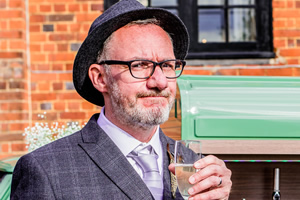
Die Hard with a Rhyming Sentence
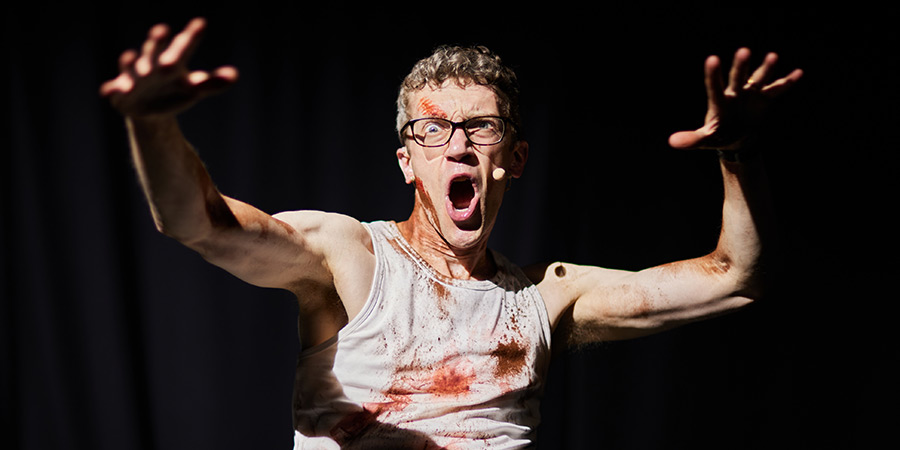
It's November, so one of life's big questions begins to rear its bloody, sweaty head again: is Die Hard a Christmas film? Far too touchy a topic to tackle here, of course, but Die Hard definitely is now a long-form romantic action poem.
Rogue Pun's favourite show at this year's Edinburgh Fringe, Yippee Ki Yay is the witty, moving and generally joyous creation of Richard Marsh, 'CEO of the MCU,' as his website bio puts it: the Marsh Connected Universe.
Marsh's metier is epic poetry; he's like a jollier John Milton with a couple of acclaimed Radio 4 comedies already racked up, Love And Sweets and Cardboard Heart. But his new work goes blockbuster, taking that Bruce Willis classic in a bold new direction and around the UK, pre-Christmas: to Norwich, Salford, Oxford, Bedford, and a month-long run in Islington. Very seasonal. Or not?
Either way, he throws quite a party, pals.
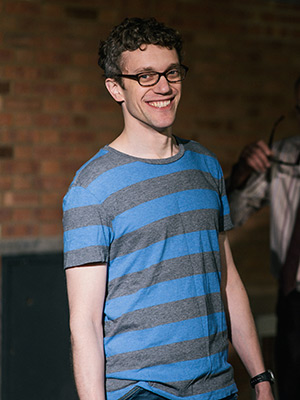
How did Yippee Ki Yay happen - were you destined to do something about Die Hard?
I've always loved the film. I'm not sure when the notion of telling it as a poem came about. A while ago, though. For a long time it was an 'I must do that when I have the time' idea.
Then, during the second lockdown, I was working on another play, which was decent but quite hard going, and I realised it was the wrong thing to be doing at that time. I wanted to make a show that would be a lot of fun to do and hopefully a lot of fun to watch. The reaction we had at the Fringe makes me hopeful we might have succeeded.
It's a lovely show - how would you describe it?
That's very kind. The short answer is, it's a fan retelling the movie. The longer answer - it's all my love for the film, and the cast, and also for fandom itself.
I'm trying to retell the story of the film while also capturing the emotional experience of watching the film; both in the moment and over time, in that our feelings about a piece of art change as we change. My take on Die Hard when I first saw it as a kid is different to watching it now as an adult and parent.
What was your approach to taking on the Bruce Willis/John McClane role - poets aren't always obvious action heroes?
That was always part of the joke for me. A lot of my ideas start as jokes and the work is then finding the truth, the emotional story beyond that. Telling Die Hard as a poem seemed funny to me. So did my specky, skinny self playing John McClane.
But then, when you look deeper - John talks to himself throughout the film. He has no one to talk to, from the terrorists' arrival until he gets hold of the radio. So John actually monologues in the film and that lends itself to the monologue / poetry style, which I extended from John out to the other main characters. This allows people to have more of a voice than the movie - for example, Holly gets to tell us how she feels about her bosses and her husband.
In terms of obvious action heroes - that's something we're keeping in mind for the future life of the show. I'm very different from the action hero stereotype. As other actors play the role, we're looking to cast people who are differently different from Bruce Willis.
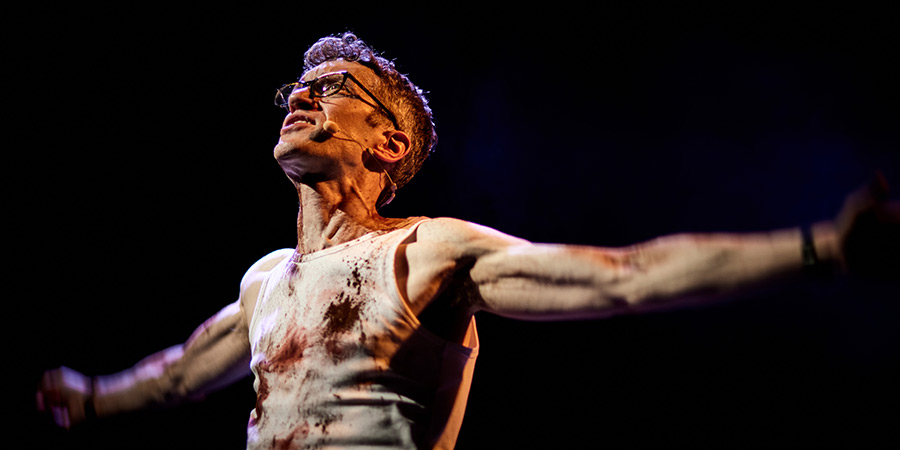
For this Christmas run, Darrel Bailey and I are sharing the role. We're different casting and I can't wait to see his version of the part.
How many times do you reckon you watched Die Hard, while creating the show? Lots of research?
I couldn't tell you. A lot!
I started by splurging out all my memories and feelings about the film before re-watching. Then I watched it through a bunch of times as I restructured the plot, then went on to watch individual sequences when working on those particular moments. Then there was a further stage of watching with Hal, the director and Emma, the movement director, in rehearsals.
Beyond that I read all I could around the making of it, the source novel, and a fantastic book called Die Hard: The Ultimate Visual History by James Mottram. James actually came to the show in Edinburgh and loved it, so his tastes in plays is as good as his taste in movies.
Is YKY's love story quite autobiographical, or mainly a flight of fancy?
Yes.
But also, in another sense, definitely not.
The show has a cleverer format than I'd anticipated - was it always like that?
In terms of the format, it's hard to talk about without giving too much away. The structure of the Jen story kept changing, basically because I kept writing it too long for the slot we had booked for Edinburgh.
I kept cutting it back, but those cut-downs would take the life out of it, so I'd rewrite and it would get too long again. Very late in the process, a structural change allowed me to tell that story in a much more concise, powerful way and that was the key to unlocking all the material I'd built up over the various drafts and getting to the show you saw at the Fringe.
How did you find the Fringe run? Was this a broader audience than your previous shows?
I had a fantastic time at the Fringe. Both in terms of doing the show and in terms of being in that community of people making shows, and watching shows, after two years of covid. I found it really nourishing and just very joyful to be part of that and among large groups of people experiencing live performance again.
Hard to say if it was a broader audience. There were certainly people there because of Die Hard rather than because they'd seen my stuff before. It was a bigger venue than I've played before at the Fringe, which was slightly daunting in that you want it to be full. But with comedy, when it's working, a bigger venue is easier to play than a smaller one.
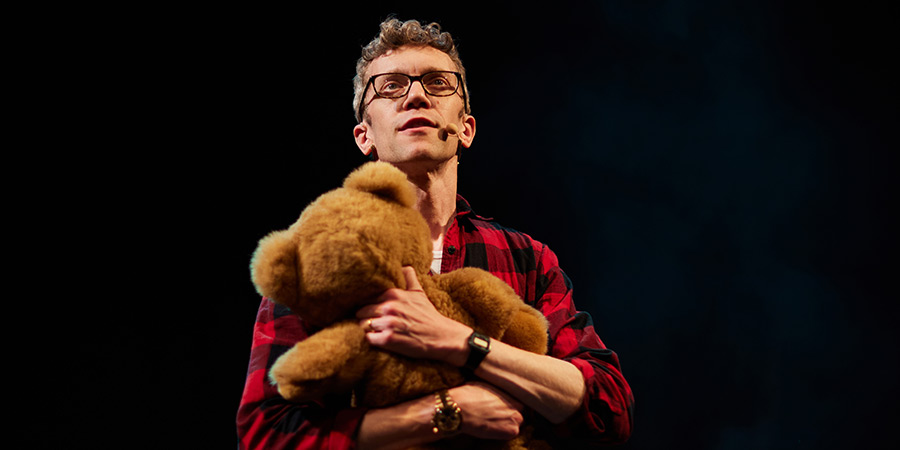
Any interesting audience responses?
A lot of people come up and talk to you after shows, which is one of the things I particularly love about the Fringe - you get that conversation with the audience. People shared their love of the film, and one family who take a group Christmas photo every year took a selfie with me to be this year's card. So somewhere out there a bunch of people are going to have me in my sweaty vest on their mantlepieces.
How do you follow this now - are there big ideas for the next show?
I'm writing a sitcom based on my childhood growing up in Somerset. My parents ran a smallholding and B&B, not entirely deliberately. The show's about a family living together and working together. Sort of Modern Family living at The Office.
Beyond that I've always loved genre (as you may be able to tell from Yippee Ki Yay) and I'm working on a couple more TV ideas, and what might turn into a book series for children.
Help us publish more great content by becoming a BCG Supporter. You'll be backing our mission to champion, celebrate and promote British comedy in all its forms: past, present and future.
We understand times are tough, but if you believe in the power of laughter we'd be honoured to have you join us. Advertising doesn't cover our costs, so every single donation matters and is put to good use. Thank you.
Love comedy? Find out more
